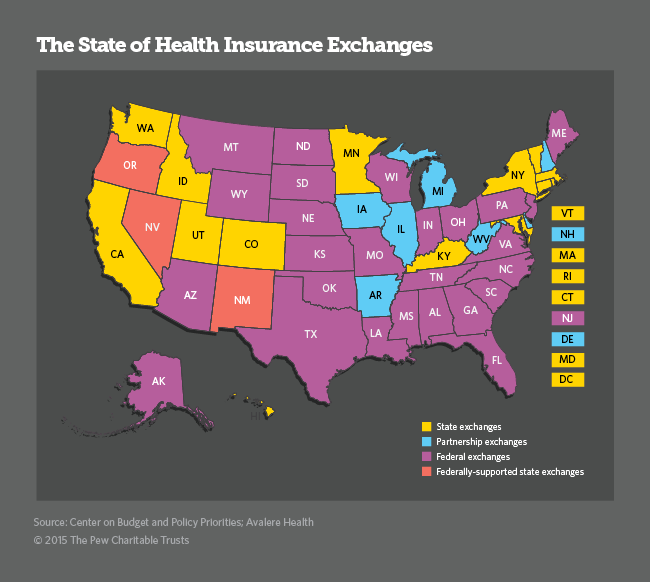Employed White Southerners Most Likely to Lose Coverage in Supreme Court Case
By Michael Ollove, Stateline

If the US Supreme Court strikes down tax credits for people buying health insurance on the federal exchange, about 8.2 million Americans in 34 states could lose their coverage under the Affordable Care Act. Most of the people likely to be affected are white, employed, and low- to middle-class. They also are concentrated in a single region of the country: the South.
Health insurance rates in those states are expected to rise by as much as 35 percent, which may make coverage unaffordable even for those who don’t qualify for tax credits. Some believe that if the tax credits are disallowed by the Supreme Court, the underpinnings of President Barack Obama’s signature health care law would collapse.
“It will be a horror movie if (the credits are struck down),” said Georges Benjamin, executive director of the American Public Health Association, which supported passage of the ACA.
At issue in King v. Burwell, scheduled for oral arguments next month, is whether people in states that use the federal government’s exchange (Healthcare.gov) to buy insurance are eligible for federal subsidies in the form of tax credits to help them pay their premiums.
The case hinges on the fact that the ACA provision governing tax credits refers to people enrolled "through an Exchange established by the State," without mentioning the federal exchange. The ACA anticipated that all states would create their own state exchanges, but it allowed states that did not want to set up their own exchanges to use the federal one instead.
The lawsuit originated at a 2010 meeting of conservative lawyers convened by the American Enterprise Institute to explore "legal vulnerabilities" in the ACA. After the lawyers identified the tax credit as a promising point of attack, a related right-leaning group, the Competitive Enterprise Institute (CEI), found four Virginia plaintiffs to launch the lawsuits (King v. Burwell consolidated them). According to its website, CEI is coordinating and financing the legal effort.
Opponents — including the drafters of the original law, 21 states and the District of Columbia — say that whatever the exact language of the statute, Congress did not intend to make any distinction between federal and state exchanges when it came to tax credits. When questions were raised about the language, the IRS announced in 2011 it would issue the credits in states with federal exchanges, too.
In the 34 states where people use the federal exchange, an estimated 9.3 million people are expected to receive $36.1 billion in tax subsidies in 2016. A recent analysis by the Robert Wood Johnson Foundation and the Urban Institute estimated that if the Supreme Court blocked these subsidies, 8.2 million of these residents would not be able to find affordable health insurance in 2016.
"(A King win) disenfranchises millions of Americans from affordable health coverage, most of them working people," said Trish Riley, executive director of the National Academy for State Health Policy.
Pages: 1 · 2
More Articles
- Department of Labor Awards $5M to Train, Expand Pathways for Women for Registered Apprenticeships, Nontraditional Occupations
- Julia Sneden Wrote: Going Forth On the Fourth After Strict Blackout Conditions and Requisitioned Gunpowder Had Been the Law
- Voting Rights: Assistant Attorney General Kristen Clarke Testifies Before the Senate Judiciary Committee Hearing; “One of the most monumental laws in the entire history of American freedom”
- The GAO Finds: Elder Financial Exploitation — The Fraudulent or IIlegal Use of An Older Adult's Funds or Property — Has Far-reaching Effects on Victims and Society
- How are States Prioritizing Who Will Get the COVID-19 Vaccine First? CDC’s Advisory Committee on Immunization Practices (ACIP) Released an Interim Recommendation For the Highest Priority Group
- Stateline: Many Faithful Say It’s Time to Gather. Some Governors Disagree
- Balloon Bombs and Blackouts in World War II; For Some a Familiar Time of Anxiety; Growing Up in the Second World War From England's Imperial War Museum
- Weekly National Summary of Week 50: Outpatient Illness Surveillance, Geographic Spread, Mortality Surveillance
- 4.7 Million Uninsured People Nationally Could Get a No-Premium Bronze Plan in the ACA Marketplace, Though Deductibles Would be High
- Jo Freeman: The Equal Rights Amendment is BAAACK! Much Has Changed Since the First ERA Was Proposed 98 Years Ago






